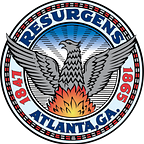President Moore Opens Dialogue on Policing and Community Involvement
Atlanta City Council President Felicia Moore sought to open a dialogue with representatives of the International Brotherhood of Police Officers, including Local 623 President Jason Segura, during the Council’s budget briefing Thursday with union officials following the death of George Floyd in Minneapolis.
Floyd, a 46-year-old African American man, died Monday in Minneapolis after being handcuffed and pinned to the ground by a police officer, an incident that was recorded on video and sparked protests in the city.
The conversation during Thursday’s budget briefing for the Council centered on law enforcement accountability and efforts to better connect the public with Atlanta’s police.
“My heart is heavy and I’m sure all of our hearts are heavy when we watched the video of George Floyd’s death by a police officer. It struck me, and it’s been a culmination of issues that have occurred. We’ve had some in Atlanta, so I don’t want to act as if Atlanta is immune to it,” Moore said. “My heart was so, so heavy yesterday and I reached out to an APD officer that I know who is out there doing great things in the community and trying to bring together police officers and members of the community and create and foster some understanding.”
Moore sought feedback from union representatives about what efforts Atlanta police have taken to better connect with residents, as well as what steps could be taken in the future to ensure effective and responsible policing.
In response to Moore’s concerns, Segura noted that open lines of communication would be one of the best avenues toward addressing such issues.
“When we see something like that happen, it affects us and hurts us all,” Segura said.
He added that law enforcement officials have sought ways to connect and that there’s a recognition toward the need to be in front of community members to have an open dialogue.
Ken Allen, former APD investigator, former president of the Local 623, and a national representative for the union, noted situations such as the one in Minneapolis are “some of the hardest to deal with based on the fact that the climate we police in and how we carry ourselves in Atlanta is different than many of the other places across the United States,” particularly with the fact that the city’s history is built upon civil rights and that it’s home to the civil rights moment.
Following the meeting, Moore noted that it’s imperative to work with the union representatives and have a dialogue to address issues.
“I believe it is about relationship building. We have to commit to developing an effective means of communication — and it’s not when something happens, it must occur before that.”
